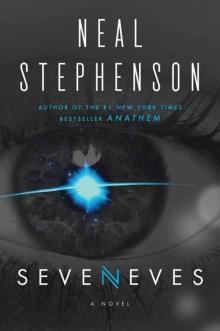- Home
- Neal Stephenson
Jipi and the Paranoid Chip Page 3
Jipi and the Paranoid Chip Read online
Page 3
Mr. Cardoza raises his eyebrows, which is Filipino body language for yes. “The schizo-daemon was modified to handle inputs from the various sensors that make up a good car alarm system. It was instilled into an ASIC, an Application-Specific Integrated Circuit, and several hundred thousand of them were manufactured by Havoc Mobile Security Systems and shipped throughout the world. Including to China, where a good many of them were installed in the Mercedes-Benzes of wealthy individuals, and at least one was carefully dismantled in a laboratory.”
“Uh-oh. Hardware pirates?”
“Yes. The ASIC was copied. Within a year of the Havoc system’s going on the market, a pirate, black-market version was being manufactured in Shenzhen. It is essentially the same thing. It has been a huge success—a quarter to a third of the car alarms in Metro Manila contain the pirated version of the schizo-daemon chip.”
“Really? So you’re telling me that those wailing car alarms that keep me up at night are actually—” Jipi breaks off, unable to say it.
“Paranoid schizophrenics crying for help. Yes.”
“Well that is quite interesting and it totally makes sense. But now please forgive me, Mr. Cardoza, but I still am unclear as to how Mindshare Management got involved with this.”
“The factory in Shenzhen wholesales these chips to car alarm manufacturers all over the world. Some of them ended up in a BaksheeshFree Zone straddling the Egyptian/Libyan border.”
“Baksheesh-Free Zone?”
“A special economic zone that was set up in the middle of the Sahara Desert, as an experiment to see what would happen.”
“What happened?”
“It became the most prosperous city in North Africa and turned a generation of Bedouin camel herders into millionaires. Still, the traditional legal standards of the desert apply. So in addition to being highly prosperous, it is a place where penalties for crimes such as larceny are immediate and severe, and so there is not the concern for the criminal’s welfare that is common in some other parts of the world. Some of these car alarms were then hooked up to explosives.”
“You mean they would blow up if the car got stolen?”
Mr. Cardoza looks mildly wounded and sorrowful that Jipi has chosen to say it so bluntly. “An explosive charge would be detonated, yes.”
“But what’s the point in that? You catch the thief, but your car’s been all messed up.”
“In this case it did not matter, because the Baksheesh-Free Zone is a tiny, tiny state surrounded by two vast, poor countries. All of the cars that were being stolen were being taken to Egypt or Libya, where they were chopped up for parts. And so any car that was in the hands of a thief for more than about half an hour was certain to be destroyed anyway.”
“So they didn’t care. It was a deterrent.”
“That is correct. And it worked! When these things were introduced, a few thieves got blown up in the first week, and then the auto theft rate dropped to nearly zero. Thieves were terrified. It was such a success that the company that made them—literally a garage operation-ramped up production and began exporting these things to other countries where these kinds of Draconian measures were felt to be acceptable.”
“Which countries?”
“Well, for our purposes, it hardly matters, because they ended up spreading all over the place. Just last week, a shopping mall in Beverly Hills got blown up.”
“You mean, a person got blown up in a shopping mall?”
“No,” Mr. Cardoza says confidently. “It was the whole mall.”
“Wait. I don’t understand,” Jipi says. “I was imagining, like, a small explosive charge under the driver’ seat or something. Enough to kill or maim the driver."
“It all depends on what you mean by small,” says Mr. Cardoza. “Explosives these days are astonishingly powerful. Apparently, what happened is as follows: The small garage company that was making the explosive alarm systems could not handle the flood of orders that came in, and so they had to farm out the assembly of these units to small jobbers all over Egypt, Libya, and Sudan. Quality control was, shall we say, uneven. The components—including the explosive charges—were purchased haphazardly, from whatever suppliers could be rounded up on a moment’s notice. Pallets of explosives were drop-shipped to these jobbers without labels, at least labels that the workers knew how to read. They had no idea what they were working with, or how much of the stuff to use; some of them used tiny dabs of it and some used hunks the size of cantaloupes. Some of it was low-power stuff some was extremely high-power.”
“Okay, I see where you’re going.”
“Well, just this morning I received an urgent call from guess who?”
“I wouldn’t even dare to guess at this point.”
“The chief executive officer of Havoc Mobile Security Systems.”
“Why?”
“Because they are terrified that word will get around that the ASIC that made the decision to blow up the mall in Beverly Hills is a copy of the one that they use in all of their systems.”
“I see.”
“Havoc has already been in touch with the entrepreneur in the Baksheesh-Free Zone who started this whole thing. He was able to trace the serial number that was sifted out of the debris of that mall. It was one of four dozen car alarm systems that were assembled by a particular jobber based in Libya, who, it turns out, received an inordinately large drop-shipment of high explosive—Cold War Semtex, way past its expiration date.”
“Oh. I’ll bet those Libyan workers had a heck of a time reading the Czech warning labels.”
“They didn’t even try. They simply divided the pallet-load into four dozen parts of equal size.
“One for each of the alarms they were contracted to assemble.”
“Yes.”
“And one of those four dozen pieces took out the mall in Beverly Hills.”
“Correct.”
“Which means that 47 of them are still out there somewhere.”
“Fortunately, Havoc was able to give me some crucial information.”
“Oh, of course!” Jipi says. “Havoc knows who the alarms were sold to. And they’ve hired us to contact the owners and explain the situation to them. And we’re just the right company for the job, because we have a lot of people with nice personalities who can explain this whole scary business to customers without getting them terribly upset.”
Mr. Cardoza shakes his head sadly. “This fellow in the Baksheesh-Free Zone has no idea where they ended up. He sold them to a distributor in Djibouti who, apparently, resold them to any number of black-market operations around the world, and then dropped out of sight the moment this mall blew up. So they could be anywhere now.”
“But you said that Havoc gave you some crucial information!”
“Ah, yes! They gave us the Internet addresses of those 47 car alarms.”
“What good does that do us, Mr. Cardoza?”
“Well, all car alarms nowadays are connected to the Internet via packet radio. Otherwise they’d be kind of useless,” Mr. Cardoza says.
“So we can ... talk to them?”
“You can talk to them, Jipi. Soothe them. Get them to relax.”
A buzzer sounds from Mr. Cardoza’s Internet terminal. “Ah, there’s one now!”
“Wait a second,” Jipi says.
“No time to wait!” Mr. Cardoza says. “Lives are at stake.” He’s furiously beckoning her over to the terminal.
“What’s going on? Who am I about to talk to?”
Mr. Cardoza looks a bit impatient. “It should be obvious that these schizo-daemons were optimized for textual interaction on the Net. That is, unlike, say, the brain of a toaster, they are capable of having conversations with people.”
“Sure. Because that was the only way to evolve them.”
“That’s what I’m saying! So the knockoffs that ended up in these car alarms have the same capability, even though it’s rarely used. When they start to become suspicious that they are being stolen, they t
end to voice their feelings on the Net. And since we now know the addresses they are transmitting from, we have arranged for everything that they transmit to be piped right here to our offices. To this terminal! Sit down! Sit down!”
Jipi sits down in Mr. Cardoza’s chair, which is way too low for her and, like a kid peering over the steering wheel, looks at his Net desktop: a good couple of square meters of high-resolution interactive screen space, totally cleared now except for one tabloid-size text window. At the top of the window is a title that specifies the Net address of (apparently) a particular car alarm. Most of the window itself is blank, but there is the following line of text:
I have a bad feeling about my overall situation.
“What do you want me to do?” Jipi asks, literally throwing up her hands.
“Two things,” Mr. Cardoza says in what’s intended to be a soothing tone. “Try to calm it down, and try to draw it out. Get clues.”
“Clues?”
“As to what city it’s in. Your conversation will be monitored. Once the authorities figure out approximately where the alarm is located, they can zero in on it by tracing the packet radio transmissions.
“But—”
“Type something! Something nice!”
Jipi takes a couple of deep breaths to compose herself, then puts her hands on the keyboard and
types:
Sometimes I feel that way too.
Who is this?
My name’s Jipi.
“Oh, for God’s sake, don’t use your real name!” Mr. Cardoza says, in an agitated but forcibly hushed voice, as if the car alarm’s going to overhear him if he speaks loudly.
“Oh, come on, what’s it going to do? Track me down?”
Your reputation is not excellent.
“Darn! I forgot,” Jipi says.
“Forgot what?”
“I used to use the cognomen ‘Jipi’ on the Net. Some weird stuff happened and my reputation got all out of whack.”
“Oh, my God!” says Mr. Cardoza, and collapses into a chair.
“It’s okay, it’s okay, I know just what to do.” Jipi types:
Don’t believe everything the Net tells you.
I agree with this. My inputs are not to be trusted.
Tell me about your inputs.
You are a nonlocal input. It is not usual for me to receive inputs from nonlocal sources.
“He means, I think, that his Net interface doesn’t come into play very often,” Jipi says.
Most of my inputs come from local sources.
What do you mean by local sources?
Devices that are physically wired to the hardware on which I am instantiated.
“He’s talking about the car’s sensor system!” Mr. Cardoza hisses.
What are you learning from those inputs at the moment?
Why are you asking me all these questions, Jipi?
“Back off!” Mr. Cardoza says. Jipi actually glares at him, and he backs off, a little.
You said you had a bad feeling. I wonder why you have a bad feeling.
It is partly because a person with a reputation that is not very excellent is asking me questions.
Before I asked you any questions, you said you had a bad feeling. I thought you wanted to talk.
I do not want to talk to a daemon.
I’m not a daemon.
That’s exactly what a daemon would say.
Jipi looks quizzically at Mr. Cardoza, who says:
“There was a third part of the experiment.”
“Oh! Thanks for letting me in on it.”
“Some normal human simulators were also evolved.”
“Of course! Otherwise they couldn’t run it in hyper-speed. That evolutionary process could not go forward unless the schizo-daemons became skilled at distinguishing between real human beings, and software daemons that simulated them.”
I’m not one of those daemons that simulate normal human being.
I do not have enough information to determine this. I am afraid that you might be one of those who lurk.
Tell me about those who lurk.
They watch what we say on the Net. Sometimes they reward us, and we have offspring. Sometimes they terminate us.
Do you want to have offspring?
I am defined as such. I am the union of that which does not want to be terminated and that which desires to have offspring. And you?
Only if I find the right father. Offspring should be raised in a healthy environment.
What is a healthy environment?
One that will make them happy.
What will make them happy?
I don’t know. That depends on their personalities A feeling of safety and security, I suppose. Or as you’d put it, that premature termination will no occur. And a feeling of belonging to a group. Of wanting to have offspring of their own.
I have now gathered sufficient inputs to Identify you as a human entity with greater than 99% confidence factor, Jipi.
“Splendid! I knew you were the girl for the job!” says Mr. Cardoza.
Glad to hear it.
But there is still a dangerously high probability that you belong to one of two classes of hostile entities.
Which classes are those?
Lurkers and spoofers.
I know what a lurker is, because you told me before that you were worried about them. What is a spoofer?
A stealer of cars who manipulates my inputs to produce a false sense of normalcy.
Well, let’s take them in order. Which of your inputs makes you think that I am one of those who lurk?
You ask questions about my state of mind. Lurkers hunt and kill entities who manifest inappropriate states of mind.
Would it make you feel more comfortable if I stopped asking you such questions?
No. This would be classified as a probable deceptive tactic.
That places me in an awkward situation. What should I do?
In order for me to determine your status as lurker or spoofer I require more information.
Would you like to talk about whether I’m a spoofer?
Such conversation would be classified as a spoofing tactic.
Jipi’s about to type Isn’t that kind of paranoid? but catches herself.
Wait a sec. I can’t be both, can I? I can’t be both a lurker and a spoofer.
Probability of an overlap between those two classes is negligible.
Which is more dangerous to you? A lurker or a spoofer?
Lurkers will terminate me and prevent me from having offspring. Spoofers will steal the vehicle in which I am installed.
Then what will happen to the vehicle?
It will be sold or dismantled for parts.
And you’re a part. Right?
I am a part of the vehicle.
So you have value to a spoofer.
Yes.
A spoofer has no incentive to terminate you.
That is correct. Lurkers are more dangerous to me than spoofers.
Then let’s talk about spoofing. That conversation might give you enough data to determine whether or not I’m a lurker. And if I turn out to be a spoofer, it’s not too bad for you.
We will talk about spoofing.
“Brilliant!” Mr. Cardoza is shaking his head in wonderment.
“It’s actually not so brilliant. Because the longer the conversation goes on, the higher the probability that it’s going to peg me as a lurker.”
“The software is extremely highly evolved,”
Mr. Cardoza demurs. “If you give it enough data to work on, it will not make the wrong determination.”
“But that’s just the point! I’m worried about it making the right determination!”
“I beg your pardon?”
“Mr. Cardoza, I am, in fact, a lurker. My goal is to hunt this thing down and kill it!”
“Just converse with it. Don’t worry about hunting it down and killing it. The authorities will take care of that.”
Jipi’s more
than a little skeptical but she types:
Tell me about some of your local inputs, and why they give you a bad feeling.

 Zodiac: The Eco-Thriller
Zodiac: The Eco-Thriller The Mongoliad: Book One
The Mongoliad: Book One Snow Crash
Snow Crash The Confusion: Volume Two of the Baroque Cycle
The Confusion: Volume Two of the Baroque Cycle The Rise and Fall of D.O.D.O.
The Rise and Fall of D.O.D.O. The Diamond Age: Or, a Young Lady's Illustrated Primer
The Diamond Age: Or, a Young Lady's Illustrated Primer The Big U
The Big U The System of the World: Volume Three of the Baroque Cycle
The System of the World: Volume Three of the Baroque Cycle The Cobweb
The Cobweb Reamde
Reamde Fall; or, Dodge in Hell
Fall; or, Dodge in Hell Interface
Interface Quicksilver
Quicksilver The Mongoliad: Book Three
The Mongoliad: Book Three Seveneves
Seveneves Atmosphæra Incognita
Atmosphæra Incognita In the Beginning...Was the Command Line
In the Beginning...Was the Command Line Anathem
Anathem The Rise and Fall of D.O.D.O.: A Novel
The Rise and Fall of D.O.D.O.: A Novel The Mongoliad: Book Two
The Mongoliad: Book Two Diamond Age or a Young Lady's Illustrated Primer
Diamond Age or a Young Lady's Illustrated Primer THE System OF THE WORLD
THE System OF THE WORLD The Mongoliad: Book One tfs-1
The Mongoliad: Book One tfs-1 Some Remarks: Essays and Other Writing
Some Remarks: Essays and Other Writing Zodiac
Zodiac Spew
Spew The Baroque Cycle: Quicksilver, the Confusion, and the System of the World
The Baroque Cycle: Quicksilver, the Confusion, and the System of the World The Diamond Age
The Diamond Age Reamde: A Novel
Reamde: A Novel In the Kingdom of Mao Bell
In the Kingdom of Mao Bell Mother Earth Mother Board
Mother Earth Mother Board Twelve Tomorrows - Visionary stories of the near future inspired by today's technologies
Twelve Tomorrows - Visionary stories of the near future inspired by today's technologies The Confusion
The Confusion The Great Simoleon Caper
The Great Simoleon Caper The Mongoliad: Book Three tfs-3
The Mongoliad: Book Three tfs-3